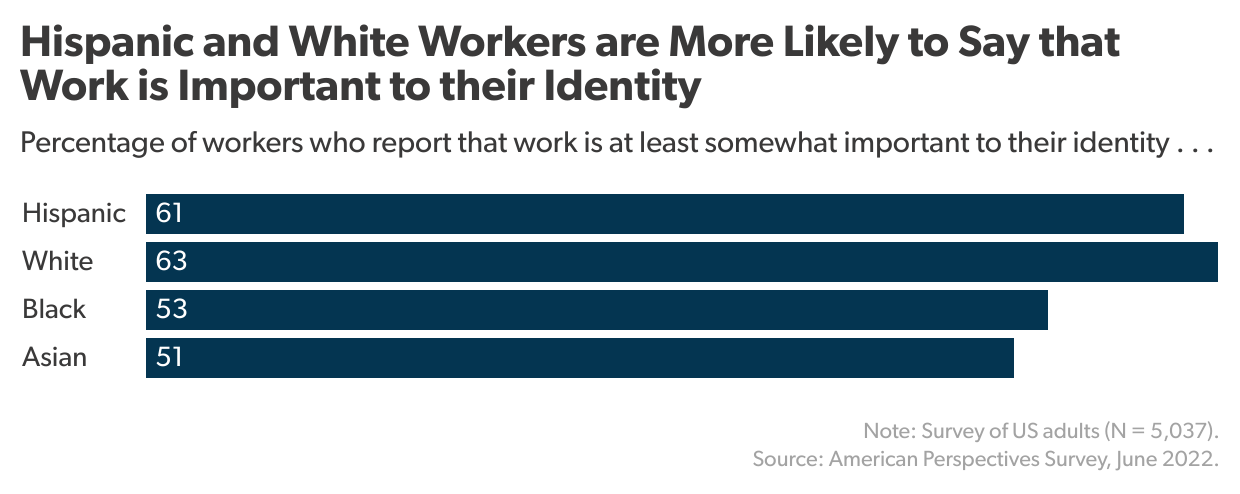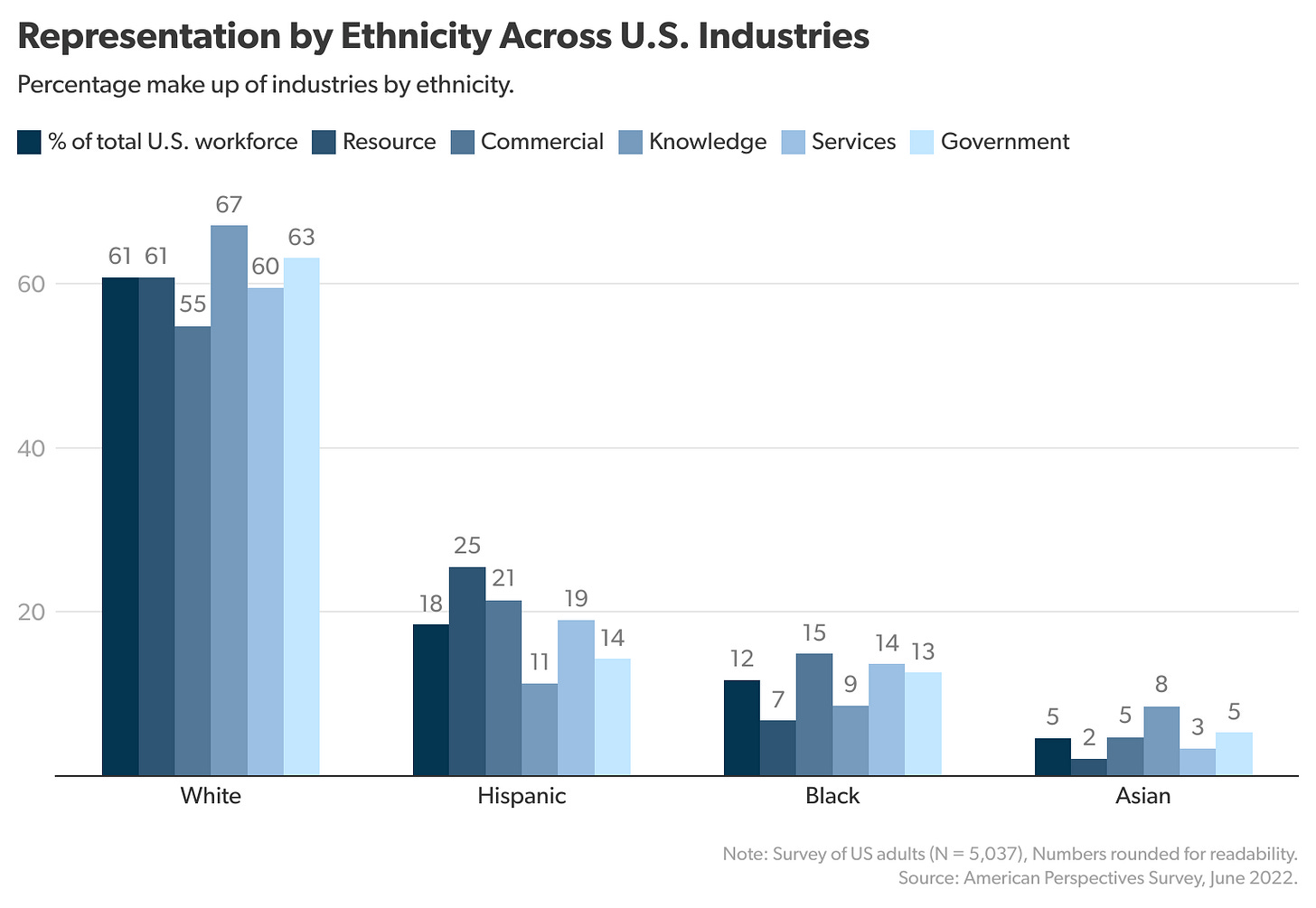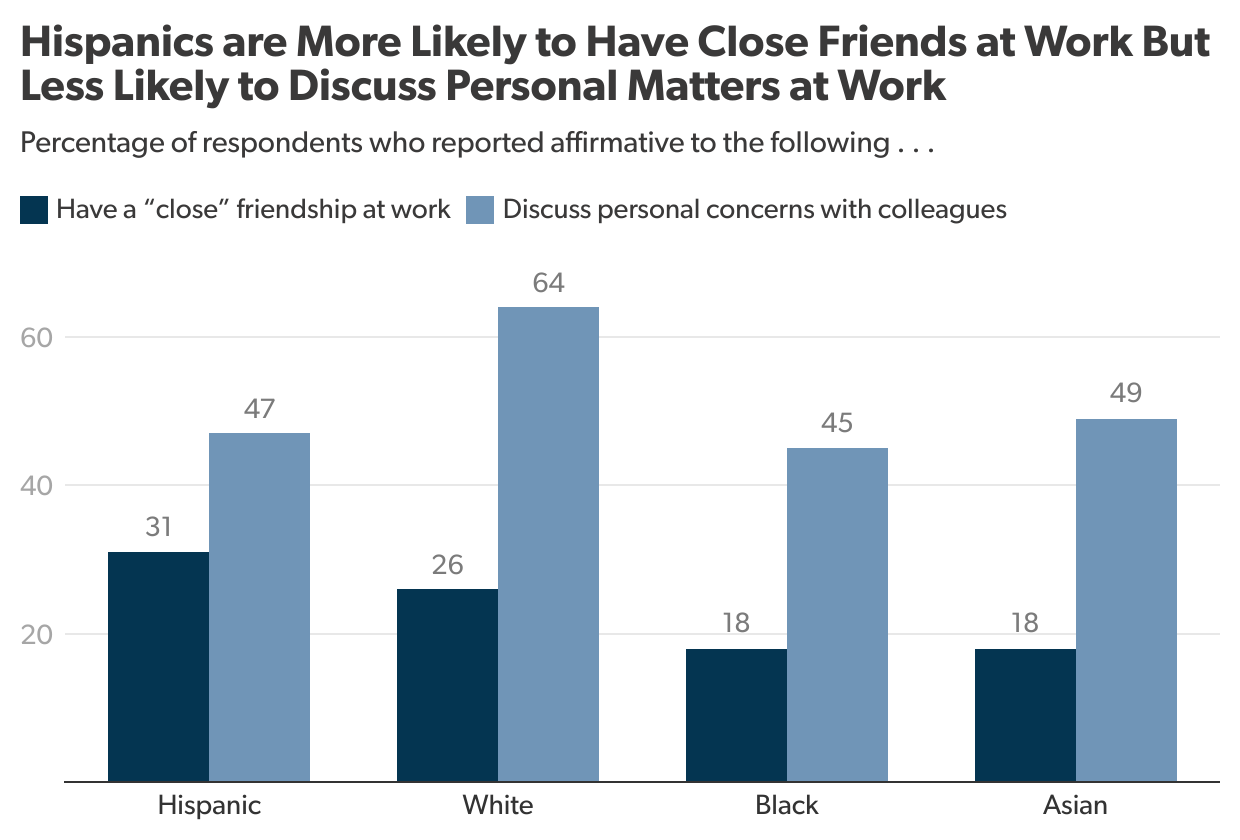How Hispanic Americans Think About Work and Identity
And what it could mean for our politics.

If we want to understand the evolving role of Hispanic Americans in American culture and politics, one useful on-ramp is studying Hispanics in the workplace. In a recent AEI survey, Hispanics reported levels of job satisfaction, of a sense of being treated fairly, and of having good relationships with bosses and co-workers that were on par with white workers.


The survey also showed that Hispanic workers, again at levels comparable to white workers, report finding value in work in terms of job interests and skill development, as well as personal identity, meaning, and pride. And Hispanic workers are also considerably more likely than white, black, or Asian workers to report having a close friend at work.


It is important to note that these positive attitudes toward work and the workplace don’t appear to be related to the wages and prestige of the sectors and jobs Hispanics work in. Relative to their total share of the workforce, Hispanics are overrepresented in “resource” occupations (agriculture, mining, manufacturing, and construction) and “commercial” occupations (retail, delivery, warehousing, wholesale trade, and real estate management), and underrepresented in more socially prestigious and more highly paid knowledge economy and government/nonprofit jobs.

As the introduction to AEI’s recent survey noted, Americans generally spend a lot more time and mental energy on their jobs than their developed-world counterparts do. This goes double for Hispanics. Hispanic workers report being less likely to participate in sports leagues or hobby groups or to volunteer their time to civic organizations. Instead, family commitments seem to dominate their non-work hours at a level not shared by other racial groups.

Despite the investment Hispanic workers make in their jobs, their social ties at work don’t seem to pay off as much as they do for other groups. Although Hispanics are more likely to say they have “close” friends at work, they also indicate less willingness to share “personal challenges” that help cement those friendships. They are also more likely to say they “never” spend time with coworkers after hours (which might interfere with those family commitments). This lower level of workplace social capital shows up in higher levels of workplace anxiety (imposter syndrome), and lower levels of “discretionary effort,” i.e. volunteering to take on tasks and responsibilities outside their normal roles, often an important gateway to promotion. Some of this is probably related to the sectors in which Hispanics are more numerous (resource and commercial jobs) but part of it may also be related to cultural and communication gaps and “bridging” social capital in the workplace that helps workers make their interests, needs, and skills known to coworkers and supervisors.


It’s a fact of life that the working world tends to reward eager-beaver, overachieving social extroverts and overlook hardworking, family-focused introverts. This is a paradox for all workers but especially Hispanics who are notable for both working hard to provide for families but also committed to “being there” in terms of home life. It requires a kind of Houdini-like genius to figure out how to work hard, care for your family, and build the civic and workplace ties that lead to new jobs or advancement in existing jobs. This is a complex set of competing demands that is never permanently solved for anyone who takes both work and family seriously. At the same time, working at achieving even an imperfect balance is necessary to develop as workers, maintain a sense of purpose and meaning on the job, and achieve greater degrees of economic prosperity.
A final thought on the political implications of this data. As I noted last year, Hispanics are hard to define with respect to economic views and preferences. They favor minimum wage increases and child-care subsidies—things that support work and increase paychecks—while expressing greater doubts about policies like a universal basic income that might blunt work incentives. These pro-work, pro-opportunity sentiments are an important reason Hispanics are increasingly open to a GOP message about economic freedom which is always the keystone interest of rising U.S. immigrant groups. For ideological reasons, Democrats want to compete on the ground of multiculturalism, identity politics, and government intervention; Hispanics want what they came here for: opportunity. They resist and resent constraints on their drive and ambition. In the midterm elections last week, Hispanic GOP support rose by 10 points compared to 2018, from 29 to 39 percent. Hispanics are still a Democratic constituency, but they appear to be moving toward “jump-ball” status. Paying attention to their economic aspirations—and not just their concerns or resentments—is likely the key to securing their loyalty in the future.


